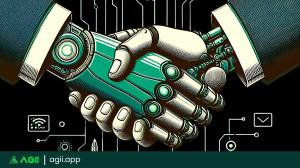AGII Introduces Modular Risk Assessment Engines for Smarter Chain Logic
New modular AI systems aim to proactively detect and adapt to real-time threats in decentralized environments.
SINGAPORE , SINGAPORE , SINGAPORE, July 7, 2025 /EINPresswire.com/ -- AGII, a pioneering platform in the AI and Web3 space, has introduced its Modular Risk Assessment Engines—intelligent systems designed to enhance risk detection and smart contract decision logic across decentralized ecosystems. These AI-powered tools will provide precise, real-time analysis to prevent vulnerabilities and ensure operational continuity.The Modular Risk Assessment Engines leverage advanced predictive modeling to proactively flag irregularities in blockchain activity before they escalate into threats. AGII’s architecture enables customizable deployment of these modules across multiple chain environments, improving scalability and reliability in risk-prone workflows. Whether detecting anomalies in transaction flows or auditing contract logic, the engines add an essential layer of security and adaptability.
By integrating these autonomous modules into Web3 infrastructure, AGII offers developers the flexibility to tailor safety protocols and AI responsiveness to their unique project needs. Each module learns and adapts over time, making smart contracts more resilient to evolving attack vectors and unforeseen logic flaws—an essential leap for decentralized systems aiming for enterprise-grade robustness.
The launch of AGII’s modular risk engines reflects the platform’s continued mission to embed intelligence and adaptability deep within blockchain operations. As decentralized applications grow more complex, AGII’s scalable solutions keep security, speed, and consistency at the forefront of innovation.
About AGII
AGII is a next-generation AI-powered Web3 platform enhancing decentralized systems through scalable automation, intelligent contract logic, and predictive infrastructure. With a suite of tools designed to simplify blockchain development and execution, AGII empowers users to build adaptive, high-performance dApps with real-time intelligence at their core.
Dorothy Marley
KaJ Labs
+ +1 707-622-6168
email us here
Legal Disclaimer:
EIN Presswire provides this news content "as is" without warranty of any kind. We do not accept any responsibility or liability for the accuracy, content, images, videos, licenses, completeness, legality, or reliability of the information contained in this article. If you have any complaints or copyright issues related to this article, kindly contact the author above.
Made In The USA Announces Top ARTIST Awards, and an Evening TAG Art Auction next weekend
NewSky Security Expands into Cyber Security Private Investigations to Combat Sophisticated Botnet and VPN Threats
CTO G. Vimal Kumar of Cyber Privilege Honored for Advancing Cyber Forensics and Digital Evidence in India
Kalendarium
Więcej ważnych informacji
 Jedynka Newserii
Jedynka Newserii

 Jedynka Newserii
Jedynka Newserii

Prawo

KE proponuje nowy Fundusz Konkurencyjności. Ma pobudzić inwestycje w strategiczne dla Europy technologie
W środę 16 lipca Komisja Europejska przedstawiła projekt budżetu na lata 2028–2034. Jedna z propozycji zakłada utworzenie Europejskiego Funduszu Konkurencyjności o wartości ponad 400 mld euro, który ma pobudzić inwestycje w technologie strategiczne dla jednolitego rynku. Wśród wspieranych obszarów znalazła się obronność i przestrzeń kosmiczna. Na ten cel ma trafić ponad 130 mld euro, pięciokrotnie więcej niż do tej pory.
Firma
Były prezes PGE: OZE potrzebuje wsparcia magazynów energii. To temat traktowany po macoszemu

Choć udział odnawialnych źródeł energii w miksie energetycznym Polski jest stosunkowo wysoki i rośnie, to ten przyrost jest chaotyczny i nierównomiernie rozłożony miedzy technologiami – wskazuje Forum Energii. Dodatkowo OZE potrzebują wsparcia magazynów energii, a zdaniem Wojciecha Dąbrowskiego, prezesa Fundacji SET, ten temat jest traktowany po macoszemu. Brak magazynów powoduje, że produkcja energii z OZE jest tymczasowo wyłączana, co oznacza marnowanie potencjału tych źródeł.
Infrastruktura
Wzrost wynagrodzeń ekip budowlanych najmocniej wpływa na koszty budowy domu. Zainteresowanie inwestorów mimo to nieznacznie wzrasta

Budowa metra kwadratowego domu w Polsce kosztuje od 5,55 do 6 tys. zł w zależności od województwa – wynika z najnowszych analiz firmy Sekocenbud. Najdrożej jest w Warszawie, gdzie cena za metr kwadratowy domu przekroczyła już 6,2 tys. zł. Na przyrosty kosztów budowy domu wpływają zarówno drożejące materiały budowlane, jak i wyższe wynagrodzenia pracowników. Inwestorzy nie rezygnują jednak z budowy domów jednorodzinnych, co ma związek m.in. z wciąż wysokimi cenami mieszkań czy też obniżką stóp procentowych.
Partner serwisu
Szkolenia

Akademia Newserii
Akademia Newserii to projekt, w ramach którego najlepsi polscy dziennikarze biznesowi, giełdowi oraz lifestylowi, a także szkoleniowcy z wieloletnim doświadczeniem dzielą się swoją wiedzą nt. pracy z mediami.









.gif)

 |
| |
| |
|